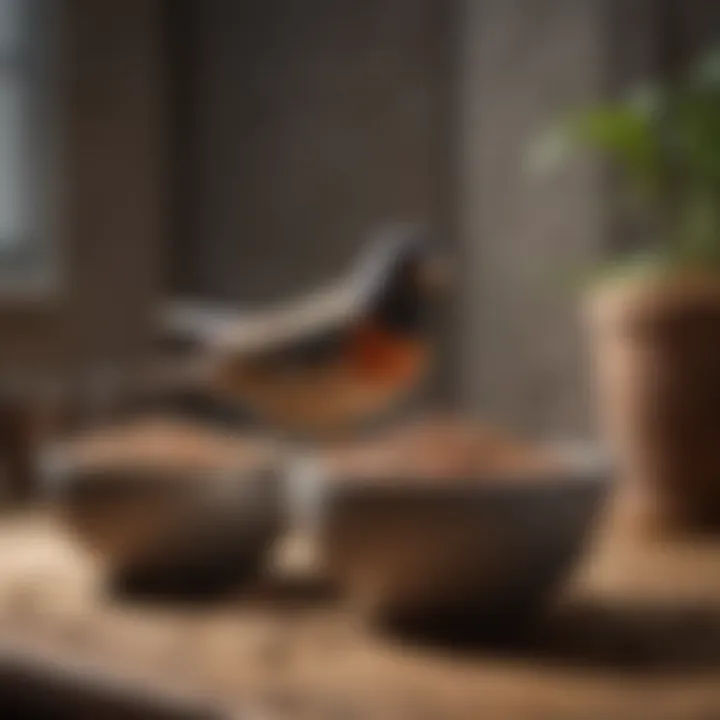Understanding the Lifespan of Pet Birds


Intro
Pet birds bring immense joy and companionship into our lives, yet understanding how to ensure their longevity can often feel like navigating a maze. The truth is, several factors play crucial roles in determining the lifespan of these feathered friends. Knowledge is power, and by delving into the essentials of avian care, emotional well-being, health concerns, and environmental needs, owners can create a nurturing atmosphere that significantly enhances their birds' quality of life.
As the old adage goes, "A happy bird is a healthy bird." In this exploration, we'll not just scratch the surface, but dive deep into the intertwined elements that foster a thriving avian habitat. So, whether you’re a seasoned bird aficionado or a newcomer eager to welcome a feathery friend into your home, this guide aims to arm you with detailed insights and practical advice.
Avian Care Basics
Ensuring a long life for pet birds begins with understanding their basic care requirements. Each species has its unique needs, but there are fundamental elements that apply across the board.
Importance of Proper Nutrition
Nutrition is the backbone of avian health. A balanced diet significantly impacts your bird's lifespan and well-being. Seeds alone don't suffice; mixing in fruits, vegetables, and fortified pellets is essential. For instance, feeding budgerigars a variety of fresh greens like kale or spinach not only keeps them invigorated but also enhances their immune system.
"Birds thrive on variety, and what's on their plate today can mean the difference between a chirpy song tomorrow or silence."
Understanding Bird Species and Their Needs
Different species boast varying lifespans and care needs. For example, parrots, such as the African Grey, live anywhere from 50 to 60 years, while canaries have a shorter lifespan, typically around 10 years. Hence, it is imperative to research your specific pet bird's requirements, from diet to social interaction. The more informed you are, the better you can cater to their individual needs.
Basics of Birds Habitat Setup
Creating a comfortable habitat is critical. A spacious cage, appropriate toys, and safe perches contribute to avian happiness. It’s vital to ensure that the cage environment is free from hazards, like sharp edges or dangerous materials that could harm your fluffy companion. Additionally, consider the placement of the cage; birds prefer being part of the family environment while having the option to retreat when they need peace.
Grooming and Hygiene Tips
Regular grooming goes a long way in ensuring a bird’s health. Beak and nail trims, along with feather care, should be routine habits. Birds also need access to water for bathing, which should be provided several times a week. This promotes good feather quality and helps them maintain their natural oils, keeping them in tip-top shape.
Interacting with Your Pet Bird
Birds are social creatures. Connecting with them is integral for their emotional health.
Building Trust and Connection
Trust is the foundation of any relationship, including with your bird. Spend time near the cage talking softly or letting your bird explore while still being mindful of its comfort. Over time, the bond will strengthen, encouraging your feathered friend to feel safe and relaxed around you.
Training Techniques and Tips
Training might seem daunting, but it's rewarding. Use positive reinforcement, like treats, to encourage desired behaviors. Simple commands like "step up" or "stay" not only enhance communication but also reinforce their trust in you.
Fun Activities for Bird Owners and Their Birds
Engaging your bird in play is another avenue for strengthening your bond. Toys that encourage mental stimulation such as puzzles or foraging devices can keep your pet entertained and healthy. Even mimicking sounds or songs can capture their interest and enhance their social interaction.
Recognizing Bird Cues and Behaviors
Learning to interpret your bird’s behaviors is vital. Birds communicate through a range of cues, from vocalizations to body language. For instance, if a bird fluffs up its feathers, it may be feeling insecure or threatened. Understanding these cues helps you respond effectively to their emotional needs.
Emotional Well-Being of Birds
A bird's emotional state directly influences its health and longevity.
The Role of Play and Socialization
Playtime isn't just fun; it's essential for mental stimulation. Birds thrive on interaction, both with humans and other birds. If you're out of the house often, consider getting a companion bird to stave off loneliness.
Enhancing Birds' Emotional Health
Birds require a balance of solitude and social interaction. Create a routine that combines both, allowing your bird to recharge while also enjoying companionship. Providing opportunities for exploration and foraging can further enhance their well-being.
Assessing Bird Stress and Remedies
Stress can lead to various health issues for birds. Signs such as plucking feathers or excessive vocalization may signal distress. Identify stressors in their environment promptly and remove them. Comforting practices like quiet time, soothing music, or even talking to your bird can help alleviate anxiety.
Building Strong Human-Bird Bonds
Developing strong bonds involves patience and understanding. Engage in regular conversations and offer unconditional love and support. As trust develops, your bird will likely become more affectionate and interactive.
Bird Health and Safety
Health concerns are paramount for any pet owner.
Common Health Issues and Prevention
Birds can fall victim to various ailments, like respiratory issues or infections. Regular check-ups and being vigilant about symptoms are essential. Providing a clean habitat also mitigates these risks.
Routine Veterinary Care
An avian vet should be a pivotal part of your bird care regime. Routine check-ups help catch potential problems earlier rather than later.
Environmental Hazards to Avoid
Be aware of potential hazards such as fumes from cooking or exposure to toxic plants. Birds are particularly sensitive creatures, and it’s crucial to create a safe environment well away from dangers.
Signs of Illness or Distress
Recognition is key. Pay close attention to changes in behaviors such as decreased activity, changes in appetite, or any unusual vocalizations. These can be tell-tale signs that something is not quite right.


Fun Facts and Quirky Insights
Birds are fascinating creatures with loads of unique characteristics.
Unique Traits of Popular Bird Species
Each bird species comes with its quirks. For instance, parrots are known for their mimicry, while cockatiels often show off their crests when excited. Learning these traits can enhance your interaction.
Historical and Cultural Significance of Birds
Birds have played a vital role in various cultures throughout history, symbolizing freedom and transcendence. Many ancient civilizations revered birds, connecting them with spirituality and omens.
Famous Bird Owners and Their Stories
In modern culture, many celebrities have taken a liking to pet birds. From Paul McCartney's love for his macaw to celebrities like Ellen DeGeneres taking inspiration from their avian friends, these stories remind us of the unique companionship birds offer.
This journey of understanding how to care for our feathered friends encourages better coexistence, and ultimately, it promises a longer, healthier life for our companions. By integrating these insights into your daily practices, you set the stage for a vibrant, fulfilling bond that will last well beyond mere years.
Intro to Avian Longevity
In the vibrant world of pet birds, understanding their longevity isn't just an academic pursuit—it's a matter of responsibility for any devoted bird owner. As these feathered companions become more than mere pets, delving into the factors that affect their lifespan becomes crucial. This article aims to sketch a comprehensive landscape of avian longevity, touching upon various elements that intertwine in defining how long our chirpy friends might grace our lives.
Understanding Lifespan in Pet Birds
Lifespan in pet birds can often feel like a mystery, deeply rooted in species, health, and environment. What's intriguing is that not all birds are created equal; their life expectancies can differ widely based on species. For instance, a budgerigar, commonly known as a budgie, can live anywhere from 5 to 10 years with proper care, while some parrots might sail past the 50-year mark. This stark contrast highlights a critical reality: birds' lifespans are multifaceted, affected not just by genetics but also by their daily surroundings and dietary regime.
An adequate grasp on what shapes a bird's longevity can arm pet owners with the knowledge they need to enhance their companion’s quality of life. It’s about knowing that an enriched environment, coupled with a balanced diet and regular vet check-ups, can make all the difference. Each aspect plays its part, creating a tapestry of well-being that can either unravel or strengthen the bonds between species and their human counterparts.
The Importance of Longevity Studies
Digging deeper into longevity studies reveals their paramount importance. When researchers study the lifespan of various avian species, they unearth invaluable insights that can transform standard pet care into a tailored health plan. In a world awash with information, it’s easy to stick to clichés and generalizations about pet care. However, longevity studies help in debunking myths and solidifying truths about our pets’ needs.
"Not all birds fit the mold. Understanding the unique traits of different species can lead to tailored care strategies that boost their longevity."
Such research typically lays bare the environmental and genetic factors that play a pivotal role in a bird’s wellbeing. By becoming acquainted with these studies, bird owners not only gain a clearer picture of what may affect their pets’ lifespans but also improve their caregiving practices. In turn, this knowledge fosters emotional bonds, as pet owners can engage in conscious care—understanding what truly benefits their feathered friends, as opposed to simply following trends or outdated advice.
Species Selection
Selecting the right species of a pet bird is crucial for those aiming to foster a long, healthy life for their feathered companions. Each species comes with its unique set of characteristics, needs, and lifespans, making it essential for prospective bird owners to be well-informed. Knowing which species is best suited for your lifestyle and preferences lays the foundation for a nurturing environment that promotes longevity. This selection process is not merely a matter of personal taste; it encompasses understanding the inherent traits of the bird species and how they interact with human care.
Lifespan Variations among Species
Lifespan varies dramatically between different species of pet birds, influenced by genetic predispositions and care practices. For example, larger birds such as macaws can live upwards of 50 years with proper care, while smaller species like budgerigars typically have a lifespan of about 5 to 10 years. Here are some notable lifespan distinctions among common pet birds:
- Cockatoos: 40 to 70 years
- African Grey Parrots: 40 to 60 years
- Lovebirds: 10 to 20 years
- Finches: 5 to 10 years
Understanding these variations helps potential bird owners gauge how much commitment they are ready to undertake. A long-living species can become a part of your life in ways that require careful planning and foresight regarding their needs. When one chooses a species trending toward a long life, it often includes considerations for creating a rich and fulfilling environment that will sustain that lifespan, not only relying on nutrition but social interaction and mental stimulation.
Factors Influencing Species Longevity
Several factors contribute to the lifespan of pet bird species, each shaping the overall health and well-being of the bird. A few pivotal elements to consider include:
- Diet: A balanced diet rich in vitamins and minerals can significantly impact a bird's health. Species-specific nutritional needs must be met to prevent deficiencies and related health problems.
- Living Conditions: The habitat setup, including cage size and cleanliness, plays a crucial role. Birds require adequate space to stretch their wings and a clean environment to mitigate disease risks.
- Social Needs: Birds are social creatures, meaning companionship either with humans or other birds is essential. Isolation can lead to stress and a decline in health.
- Healthcare Access: Regular veterinary checkups contribute to early detection and remedy of potential health issues, directly affecting longevity.
"Understanding the natural history and care requirements of a chosen species can help you tailor your approach to their health and happiness."
Making an informed choice about species selection is not just an initial step but an ongoing commitment to the welfare of your pet bird. When bird owners take the time to familiarize themselves with these factors, they are actively contributing to their birds' likelihood of leading long and fulfilling lives.
Nutritional Factors
Nutrition plays an essential role in determining the longevity of pet birds, influencing everything from their growth to their overall well-being. Providing adequate and balanced nutrition can significantly affect a bird's resistance to disease and their ability to thrive. While species selection and environmental conditions are important, without a proper diet, birds may not reach their potential lifespan. Understanding the nutritional needs of your avian companion is crucial for ensuring they live a long, healthy life.
Essential Nutrients for Longevity
Every pet bird has specific nutrient requirements that cater to their unique biology. The cornerstone of avian diets typically includes a mix of grains, seeds, fruits, and vegetables. Here’s a detailed breakdown of essential nutrients:
- Proteins: Vital for growth, repair, and daily functions. Sources include legumes and high-quality pellets.
- Carbohydrates: Provide energy and should come from whole grains or millet.
- Vitamins: Essential for metabolic processes. Birds particularly need Vitamin A for vision and immune support.
- Minerals: Calcium, phosphorus, and magnesium are crucial, with calcium being essential for strong bones.
- Fats: Healthy fats from sources like sunflower seeds or avocados (in moderation) contribute to energy and overall health.
It's like planting a garden; if you neglect the nutrients in the soil, you'll see stunted plants.
Impact of Diet on Health and Lifespan
The adage "You are what you eat" rings especially true for pets, and birds are no exception. A poorly balanced diet can lead to a slew of health issues ranging from obesity to organ failure. For instance, over-reliance on seeds can cause malnutrition, as seeds alone are often lacking in essential vitamins and minerals. A more varied diet that includes fresh produce not only boosts immune function but also plays a significant role in longevity.
Studies have shown that birds consuming a diverse range of nutrients live longer and healthier lives. Moreover, diets low in fat and sugar can help prevent conditions such as atherosclerosis and hepatic lipidosis, common in birds that eat an improper diet.
"Healthy birds are happier birds— a balanced diet makes all the difference."
Common Dietary Mistakes to Avoid
New bird owners, or even those who have kept birds for a while, can sometimes trip up on dietary choices. Here are some pitfalls to steer clear from:
- Excessive Seeds: While seeds are a favorite treat, they should not dominate the diet.
- Sugar-Rich Snacks: Foods rich in sugar can lead to health problems. Stick to natural, fresh options.
- Ignoring Fresh Foods: Fresh fruits and veggies are vital. Don’t underestimate their importance!
- Neglecting Water: Clean and fresh water ought to be available at all times. Dehydration can severely impact health.
In summation, a sound nutritional foundation is vital for avian longevity. Evaluating your bird's diet and ensuring a balance of carbohydrates, proteins, vitamins, and minerals, can significantly influence their health outcomes. By focusing on what goes into the bowl, bird owners can take significant steps toward increasing the lifespan of their feathered friends.
Environmental Conditions


Environmental conditions play a crucial role in determining the health and longevity of pet birds. These conditions encompass a range of factors, from the physical setup of their living space to the ambient temperature and humidity levels. Providing an optimal environment for pet birds isn't just about aesthetics; it's about creating a sanctuary where they can thrive both physically and mentally.
Habitat Setup and Maintenance
Setting up the right habitat for pet birds involves careful consideration of space and furnishings. A spacious cage enables birds to move around freely, which is essential for their physical fitness. It’s not just about having enough room to hop or flutter; the cage should allow birds to fully extend their wings without any hindrance. Regular maintenance is equally important. Dirty cages can harbor bacteria and pests, leading to health complications.
Some good practices include:
- Cleaning the cage regularly: Ideally, clean perches, food bowls, and toys at least once a week. Spot cleaning should be done daily to remove droppings and uneaten food.
- Rearranging perches and toys: Birds can get bored easily, and changing their environment makes it stimulating. This promotes mental activity and prevents distress.
- Providing a variety of materials: Different textures and colors in the cage can engage a bird’s curiosity and encourage playful behavior.
Temperature and Humidity Effects
The effects of temperature and humidity on pet birds can't be overstressed. Birds are quite sensitive to their living conditions. Ideally, they thrive in temperatures between 65°F and 80°F (18°C to 27°C). Too cold, and their feathers won't insulate them properly; too hot, and they may experience heat stress.
Humidity levels also matter. Birds generally prefer humidity levels between 40% and 60%. In dry environments, birds can suffer from feather damage and respiratory issues. Conversely, excessive humidity can lead to mold, affecting their overall health.
To maintain a suitable environment, bird owners can:
- Use humidifiers or dehumidifiers when necessary.
- Monitor temperatures with thermometers to ensure they remain consistent.
- Place the cage away from drafts or direct sunlight, which can cause temperature spikes.
Minimizing Environmental Stress
Every bird has its personality, and environmental stress can negatively impact their lifespan. Stress can arise from loud noises, sudden movements, or frequent changes in their environment. For instance, it's vital to keep the bird's habitat in a quiet area of the house to avoid stress from external noise.
Here are some practical ways to minimize stress:
- Establish a routine: Birds feel more secure when they know what to expect. A consistent feeding and interaction schedule can enhance their sense of stability.
- Limit sudden interactions: Especially when first introducing them to new people or pets. Slow, gentle introductions can help prevent stress reactions.
- Create a safe space: Having a safe retreat within the cage, such as a covered area or a small hiding spot, allows birds to escape when feeling threatened, helping them to manage their stress levels better.
"A well-maintained environment contributes significantly to the overall health and lifespan of pet birds. Paying attention to their needs makes all the difference."
By being attentive to these environmental factors, bird owners can offer their pets a conducive atmosphere that promotes longevity and happiness.
Social Interaction and Mental Health
Social interaction plays a significant role in the wellbeing of pet birds, directly influencing their mental health and overall longevity. Birds are social creatures, and neglecting their need for companionship can lead to various health issues. Socialization not only contributes to their emotional balance but also enhances their physical health by reducing stress and isolation. Finding the right balance of interaction is essential for maximizing your bird's lifespan and ensuring a fulfilling life.
The Role of Companionship in Longevity
The relationship between companionship and longevity in pet birds can not be overstated. Birds thrive in social settings, benefiting greatly from interactions with their owners or other birds. It’s often said, "A happy bird is a healthy bird." When they feel socially connected, their stress levels decrease, which can ward off diseases often triggered by anxiety.
Moreover, companionship can stimulate regular physical activity. Birds that engage with humans or other feathered friends are more likely to fly, play, and explore, keeping them active and engaged.
Addressing Loneliness in Pet Birds
Loneliness can be as detrimental as physical illness for pet birds. Birds left isolated for extended periods may exhibit signs of distress, including excessive vocalization, feather plucking, or even depression. Owners should watch for these behaviors as indicators that their bird may need more interaction.
If you find yourself away from home often, consider the following:
- Get a companion bird: Having another bird can provide a constant source of interaction and play.
- Interactive toys: These are great for keeping birds entertained when you can't be around.
- Scheduled interaction: Carving out dedicated times for bonding can help fulfill your bird's social needs, making it essential to engage with them routinely.
Enrichment Activities for Mental Stimulation
Just as humans need mental challenges, birds require enrichment activities to keep their minds sharp and engaged. Boredom in pet birds can lead to negative behaviors or health issues. Therefore, introducing a variety of stimulating activities is crucial.
Consider the following enrichment ideas:
- Foraging toys: These require birds to work for their food, promoting natural behaviors and cognitive skills.
- Puzzle toys: These can range from simple to complex and stimulate problem-solving skills.
- Training sessions: Teach your bird new tricks or commands. This not only keeps their mind active but also strengthens your bond.
"Mental stimulation is as important as proper diet and healthcare for your bird's lifespan."
In summary, fostering a supportive social environment and providing mental enrichment can have far-reaching effects on your pet bird's quality of life. By understanding and catering to their social needs, bird owners can contribute significantly to promoting longer, happier lives for their feathered companions.
Healthcare and Preventive Measures
When it comes to the longevity of your pet bird, healthcare and preventive measures are critical components that can’t be overlooked. While you may think that providing a proper diet and a comfortable environment is enough, the truth is, consistent healthcare practices are what safeguard the health and vitality of your feathered friend. A proactive approach can prevent diseases that can shorten their lives, much like a stitch in time saves nine when it comes to dealing with health issues.
Being attentive to your bird's health lays the groundwork for a long, happy life. Routine check-ups can spot potential problems before they escalate into serious ailments. Think of a veterinarian’s visit as a periodic tune-up; you wouldn't neglect your car's maintenance, and your bird deserves the same treatment. In fact, partnering with an avian vet can make a world of difference.
Routine Veterinary Care
Scheduling regular veterinary visits should be non-negotiable in your bird care routine. Ideally, your avian companion should see a vet at least once a year, ideally twice a year, depending on the species and any pre-existing conditions. During these check-ups, the vet can conduct physical examinations, monitor weight, and even perform blood tests to catch any irregularities early on.
But, let’s be honest; no one likes visiting the doctor. Birds, with their sensitive nature, can also feel stressed by vet visits. To ease anxiety, familiarize your pet with their carrier beforehand, and introduce them to different environments slowly. This makes the dreaded trip less daunting.
Vaccinations and Illness Prevention
Just like we humans rely on vaccinations to stave off preventable diseases, birds also benefit from immunization. Certain illnesses can wreak havoc on a bird’s health and drastically reduce their lifespan. Depending on your region and the species of your bird, vaccines may be recommended for specific diseases like avian flu or psittacosis.
It's vital to discuss vaccination schedules with your veterinarian. This will not only help in illness prevention but also keeps your bird healthy enough for socialization and interaction with other birds. Taking the time to ensure your bird is vaccinated effectively sets the groundwork for a healthy, long life.
Signs of Health Issues to Monitor
Even with fantastic healthcare, birds can sometimes fall ill. A skilled caregiver must be vigilant about changes in behavior, as these can be subtle indicators of health issues. Here are signs that you should never ignore:
- Change in Appetite: A sudden disinterest in food or drastic changes can signal problems.
- Lethargy: If your bird is less active than usual, it could be time to take note.
- Feather Plucking or Changes in Plumage: A decline in feather quality may indicate stress, nutritional deficiencies, or illness.
- Unusual Vocalizations: Any significant change in your bird’s chatter can be a red flag needing further investigation.
- Respiratory Issues: Coughing, wheezing, or labored breathing should prompt immediate veterinary attention.
In essence, keeping a close eye on your pet will provide insights into their health more than you might realize.


"An ounce of prevention is worth a pound of cure"– this aphorism fits perfectly when it comes to avian care.
The Role of Genetics
Genetics plays a crucial role in determining the lifespan of pet birds, often overshadowed by environmental factors and nutrition. Understanding genetic predispositions can offer insights into why some birds live longer than others. It's not just a matter of luck; genetic makeup lays the groundwork for health, resilience against diseases, and overall well-being.
Bird owners must recognize that genetics, much like a family tree, branches out to influence various traits, some obvious and some subtle. When selecting a feathered friend, potential owners should consider the lineage of the bird. If a particular species or breed has a history of health issues, it is likely that offspring could inherit these vulnerabilities. Thus, making informed decisions based on genetic factors can significantly enhance the lifespan potential of pet birds.
As we delve deeper, let's break down the aspects of genetics that are notably impactful in avian longevity.
Hereditary Factors Impacting Lifespan
Hereditary factors encompass numerous elements, including the genetics inherited from a bird's parents. Breeds, like cockatiels or budgerigars, can have varying lifespans, influenced largely by their lineage. For instance, a budgie from a lineage noted for longevity may have a higher chance of thriving into its advanced years compared to offspring from families where health issues have plagued the line.
Some points to ponder include:
- Previous Health Records: Animals bred by renown breeders often come with documented health history. If certain diseases cropped up in the lineage, they may be lurking in the genes waiting to resurface.
- Genetic Diversity: A diverse genetic pool can be likened to a well-balanced diet. Limited genetic diversity may predispose your bird to hereditary conditions, potentially shortening its lifespan.
- Understanding Genetic Traits: Just as humans can inherit traits like susceptibility to specific diseases, birds can also face similar inheritances.
"Understanding your bird’s genetic background can greatly aid in providing an optimal caring environment tailored to its specific needs."
Identifying Genetic Health Risks
Recognizing the genetic health risks in pet birds begins with informed selective breeding practices. Responsible breeders vet their birds for hereditary issues, such as feather plucking or heart problems, that can influence longevity. Owners should not only talk to breeders but also engage with their community for insights and experiences with specific breeds. Here are ways to identify genetic health risks:
- Health Screening: Before bringing a bird home, it's prudent to ask about any screenings conducted for common genetic disorders.
- Consulting Avian Veterinarians: Regular check-ups can help detect early signs of genetic issues. Avian vets can provide insights into prevalent breed-specific health concerns that might affect your bird.
- Community Input: Engaging with fellow bird owners on platforms like reddit.com or Facebook can provide anecdotal evidence regarding breeding and health issues.
Being aware of a bird's genetic predispositions equips the owner with the necessary knowledge to make lifestyle adjustments. Just as a well-crafted piece of art requires attention to detail, so does the care of a pet bird, considering its unique genetic background. Engaging with these aspects can not only prolong the lifespan of these cherished companions but can also enhance the quality of their lives.
In closing, genetics is both a fascinating and critical element influencing pet birds' lifespans. Understanding these factors informs better decisions for potential and current bird owners.
Common Myths about Bird Lifespan
Understanding the lifespan of pet birds comes with a host of misconceptions that can significantly impact how owners care for their feathered friends. These myths can sometimes lead to misguided practices, which in turn affect the quality of life and longevity of birds. The importance of demystifying these myths lies in providing accurate information, which in itself can empower bird owners to make informed decisions conducive to enhancing their pets' well-being. With the right knowledge, pet owners can create environments that foster not only longer lives but happier ones as well.
Debunking Misconceptions
When it comes to avian longevity, many beliefs circulate around, often perpetuated by anecdotal evidence or outdated information. For instance, a common myth is that all pet birds have inherently short lifespans compared to typical household pets. This is far from the truth. Different species have varying life expectancies. For example, while a parakeet might live around 5 to 10 years, an African Grey could live up to 50 years or more with appropriate care. Consequently, assuming all birds have short lifespans limits owners' understanding of their responsibilities and can shortchange the life quality of the pets.
Moreover, another prevalent misconception is that proper care does not significantly influence a bird's lifespan. Some owners might think that providing food and water is all it takes. This neglects the multifaceted requirements for the physical and psychological well-being of birds. Factors such as social interaction, environmental enrichment, and routine healthcare play critical roles in extending their lives. On top of that, many believe that letting birds roam freely around the house is sufficient for their exercise needs, which may not always be the case. Birds need specific opportunities for flying in a safe environment, free from obstructions or hazards.
Understanding Realistic Life Expectancy
To grasp a realistic picture of bird lifespans, one must consider the myriad factors that contribute to their longevity. Species selection is the first layer; some birds are genetically predisposed to live longer than others. Beyond species, nutritional choices make a lasting impact. A balanced diet tailored to meet the species' specific needs not only boosts immunity but also enhances quality of life, which can, in turn, lead to a longer lifespan.
Environmental factors cannot be overlooked either. Clean living spaces, appropriate temperature and humidity levels, as well as engaging environments filled with toys and stimulation, are essential. Behavioral issues stemming from boredom or inadequate socialization can lead to stress and health problems, cutting lives short despite good genetics or diet.
In summary, while understanding average lifespans for different bird species can set expectations, it’s the cumulative effort by pet owners towards dietary, social, and environmental health that truly dictates how long their pet birds will thrive. By busting myths and fostering a clearer awareness of realistic life expectancies, bird owners can make informed choices that genuinely enhance their feathered companions’ lives.
Best Practices for Bird Owners
As caregivers of pet birds, it’s crucial to understand the foundational practices that can significantly influence the health and longevity of these feathered companions. The choices you make in their daily environment and interactions not only contribute to a happier bird but can also extend their lifespan.
Creating a Healthy Environment
Creating a suitable living space for pet birds encompasses various elements that cater to their physical and emotional needs. This begins with the proper cage size, which should allow for free movement and different perches. A cramped cage can lead to stress and health issues in the long run.
Here are some key considerations:
- Space: Ensure the cage is spacious enough for the species you own. For example, a larger bird like a macaw requires more room compared to a canary.
- Perches and Toys: Mix different materials and shapes in their environment to keep them occupied. Natural wood perches can help keep their claws healthy, while toys made from safe materials stimulate their curiosity.
- Sanitation: Clean the cage regularly to avoid the buildup of bacteria and waste. A dirty environment can lead to respiratory issues and other illnesses. Change bedding and clean food and water dishes daily.
- Safe Materials: Be mindful of the materials used in and around the cage. Avoid toxic woods and paints. Opt for untreated wood for perches and ensure that any plastics are bird-safe.
Creating an inviting environment goes beyond physical needs. Birds thrive where they feel secure and can exhibit natural behaviors. Integrating elements of nature in the form of plants (ensuring they are non-toxic), or background noise like soft music, can create a more enriching space.
Fostering Strong Human-Bird Relationships
The bond between bird and owner plays a pivotal role in the overall wellbeing of a pet bird. A strong relationship can not only minimize stress but also improve the bird's mental and physical health. Engaging with your pet bird daily strengthens this bond, promoting trust and a better understanding of their needs.
Here are some practices to strengthen this relationship:
- Daily Interaction: Spend time each day talking to your bird, gradually increasing the duration and intimacy of these interactions. Many birds enjoy chatter and can even mimic sounds and voices.
- Training: Teaching basic commands and tricks using positive reinforcement can deepen the connection. A little treat goes a long way in encouraging good behavior and interaction.
- Body Language: Learn to read your bird’s body language. Signs of comfort include relaxed feathers, an upright posture, and playful behavior. Conversely, if they are puffed up, hissing, or showing their beak aggressively, they might need space or calmness.
- Involvement in Daily Tasks: Let your bird observe and participate in activities around the house. This not only stimulates their mind but can also foster a sense of belonging in your family.
Caring for a pet bird is a journey together. While their lives may be shorter than ours, quality time spent nurturing that bond is what truly matters.
Incorporating these best practices into your daily routine doesn’t just improve the quality of life for your pet, but it also enriches your life as well. The joy of seeing your bird flourish and thrive in a secure environment filled with love and stimulation resonates deeply, affirming that the effort made as a caregiver enhances longevity in meaningful ways.
Epilogue: Enhancing Lifespan through Knowledge
In summary, comprehending the various factors that influence a pet bird’s lifespan plays a crucial role in enhancing both their quality of life and longevity. Knowledge empowers bird owners, allowing them to make informed decisions that positively impact their feathered companions. When bird lovers grasp how species selection, nutrition, environmental conditions, social interaction, and healthcare interplay, they can create a harmonious living situation that promotes health and happiness for their pets.
Summary of Key Factors
The journey towards a longer and healthier life for pet birds is an intricate mosaic of elements that need consideration:
- Species Selection: Different species exhibit varying lifespans. For instance, larger parrots often live longer than smaller finches. Owners should choose wisely, matching their lifestyle to the bird's needs.
- Nutritional Factors: A balanced diet rich in essential nutrients is vital. Many bird owners overlook the significance of providing varied food sources, including fruits, vegetables, and fortified seeds.
- Environmental Conditions: The physical space matters immensely. Proper cage size, cleanliness, and the right temperature can make a dramatic difference in overall health and comfort.
- Social Interaction: Birds are social creatures. Regular interaction with both humans and other birds helps prevent loneliness. Birds thrive in stimulating environments, so offering toys and activities is essential.
- Healthcare: Regular vet check-ups and vaccinations can catch potential health issues before they become serious.
Emphasizing these factors can lead to profound improvements in a pet bird's life, enabling them to not only survive but thrive.
Future Research Directions in Avian Longevity
Looking ahead, further research on avian lifespan is necessary to grasp the nuances that lead to enhanced longevity in pet birds. Some promising areas include:
- Genetic Studies: Understanding the hereditary factors that affect lifespan could inform breeding practices, fostering healthier birds.
- Longitudinal Health Studies: Monitoring pet birds over their lifetime could provide invaluable data on the impact of various factors, helping identify key areas for improvement.
- Dietary Research: Investigating specific dietary elements and their direct effects on health outcomes will enhance dietary recommendations for bird owners.
- Behavioral Studies: Examining the links between social behavior, mental health, and longevity can highlight the importance of social interaction and mental stimulation.
In closing, the future of avian research holds potential for discovering innovative approaches aimed at extending the lives of pet birds. Engaging with these studies will only further enrich the bond between humans and their avian companions, ultimately leading to happier, healthier lives.















